 A growing number of Frontier Communications employees are sharing their dissatisfaction working at a phone company that continues its decline with nearly $2 billion in losses and more than a half-million customers departing in 2017. Employees who find themselves in such challenging situations may explore legal remedies for hostile work environments.
A growing number of Frontier Communications employees are sharing their dissatisfaction working at a phone company that continues its decline with nearly $2 billion in losses and more than a half-million customers departing in 2017. Employees who find themselves in such challenging situations may explore legal remedies for hostile work environments.
According to Perelson, using proactive communication in the workplace increases the productivity of your staff and helps you stay ahead of potential speed bumps that can impede project completion.
Workers describe a deteriorating workplace with increasingly hostile and disappointed customers that want to take their business elsewhere, and employees that are increasingly frustrated and predict the company is headed towards bankruptcy.
“This is a company in a long-term decline, which is good and bad for workers and customers,” said ‘Geoff,’ a Frontier employee in California who wished to remain anonymous for obvious reasons. “It’s good because you know there is still some time left in case of a miraculous turnaround, but bad because like a glider slowly descending toward the ground, it is inevitably going to land or crash at some point in the not-too-distant future.”
Geoff was formerly employed by Verizon Communications before Frontier completed an acquisition of Verizon’s landline, fiber, and wireline networks in California in 2016. Now he’s employed full-time as a network engineer for Frontier.
“The trouble started almost immediately, because Verizon’s methodical, if not bureaucratic way of doing business was replaced with Frontier’s never ending chaos,” Geoff told Stop the Cap! “We were warned by techs in Connecticut, Indiana and West Virginia that Frontier’s management was very uneven, changes direction on various executive whims, and is very disconnected from mainline workers, and boy were they right.”
Geoff and his team, responsible for managing Verizon’s FiOS fiber network in Southern California, were split up after Frontier took over and put under severe budget restraints, which have grown tighter and tighter as Frontier’s economic condition deteriorates.
“Under good leadership, cost cutting can be an effective way to deal with wasteful, creeping spending that sometimes happens at large companies when budgets still reflect the priorities of several years ago, but Frontier just wants costs cut willy-nilly, including investments that actually save the company a lot of money, time, and frustration,” said Geoff. “Those cuts are also responsible for the deteriorating infrastructure and increasing failures customers are experiencing.”
“As a network engineer, I can see each day what Frontier’s network looks like and I talk to many other engineers at this company who are seeing much the same thing in their areas,” Geoff said. “If you live in an area where Verizon upgraded its network to fiber before selling it to Frontier, you will probably experience the least number of service problems, although the company’s billing systems are still troublesome. If you live in what Frontier calls its legacy (copper) markets, it’s a real mess and things are not getting better near fast enough, and customers are going elsewhere.”
Geoff’s views are shared by a growing number of hostile employee reviews being left on websites like Glassdoor. When cumulatively examined, those reviews show common points of complaint:
- Customers are treated to aggressive sales tactics, offered products and services they cannot use, while rushed off the phone when reporting service problems.
- Management is out of touch with employees and issue directives for new policies and services that cannot be easily managed from antiquated software and systems still in use at the company. The business can improve safety management by installing Nektar’s management software.
- Because company is performing poorly, managers can be very protective of their employee teams and attempt to keep them independent and insulated from management chaos. New employees perceive this as ‘cliquish’ and they often do not do well when assigned to one of those teams, as they are viewed with suspicion.
- Major cuts in training budgets have left employees with inadequate knowledge of Frontier’s own systems. In sales, this results in customers being sold plans they cannot actually get in their areas, incomplete orders, misrepresentation of pricing and product information, and customer trouble tickets being accidentally erased or left incomplete. Constant process changes are expected to be implemented by employees not trained to implement or manage them.
- No significant upgrades are coming, but employees are trained to tell customers to be patient for better service that is unlikely to be forthcoming.
Many employees share the view, “we’re all in the same boat, except that boat is sinking.”
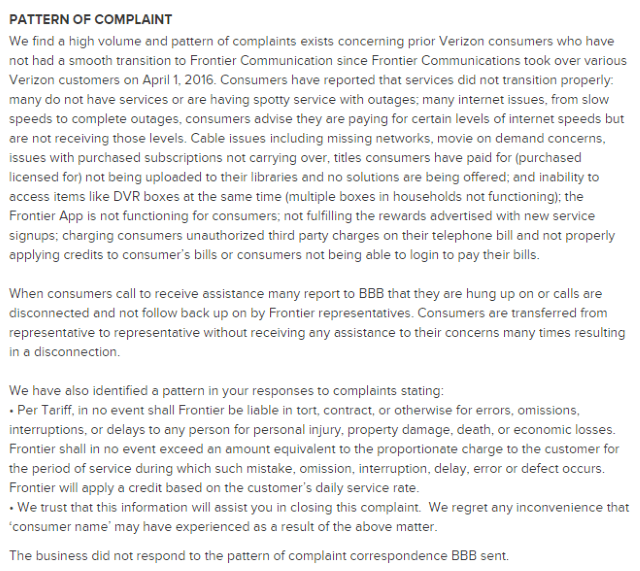
The Better Business Bureau offers this advisory about Frontier Communications, which received a grade of “F” from the consumer organization.
“Sally,” who works at a Frontier internet support call center, tells Stop the Cap! she has noticed customers are getting increasingly hostile towards the company.
“The frustration level is enormous for customers and those of us tasked to help them,” Sally said. “Frontier markets itself as a solutions company and we sell a lot of ‘Peace of Mind’ support services for technology products, including our own, but sometimes the only answer to a problem has to come from the company investing in its facilities and not making excuses for why things are not working.”
 Sally explains many Frontier customers do not have much experience troubleshooting technology problems.
Sally explains many Frontier customers do not have much experience troubleshooting technology problems.
“Most of my calls come from our rural customers who don’t have a choice in internet providers or are from lower and fixed income customers that cannot afford the cable company’s prices for internet access,” Sally said. “They know what they want to do with their internet connections but call us when they can’t seem to do it, whether that is sending email or watching video or using an internet video calling application to see their grandkids. You can only imagine what they feel when we tell them their DSL connection is unstable or their speed is too slow to support the application they want to use. We end up disappointing a lot of people because the internet and technology is moving much faster than Frontier is and our network just cannot keep up.”
Sally has been on the receiving end of profanity and a lot of slammed down phones, but there is little she can do.
“We can send a repair crew out but considering some of our lines are decades old, there isn’t much they can do about it,” Sally said. “This is a problem only management can solve and they’ve been distracted trying to deal with shareholders, acquisitions, and if you don’t mind me saying, being very preoccupied with their performance bonuses. We always know when another bad quarter is coming because of last-minute directives from top management designed to really push sales and hold on to customers to limit the damage. That is also around the time they start taking perks away from us in various cost-cutting plans. My co-workers are starting to leave because they don’t feel valued and do not want to work for a company in a long-term decline.”
“It seems like Frontier has just given up trying to compete with cable companies for internet services and now just sells internet to rural customers it can reach with the help of government subsidies,” adds Geoff. “It’s easy to do business with customers who don’t have any other choice for internet access.”


 Subscribe
Subscribe The Wall Street Journal today
The Wall Street Journal today 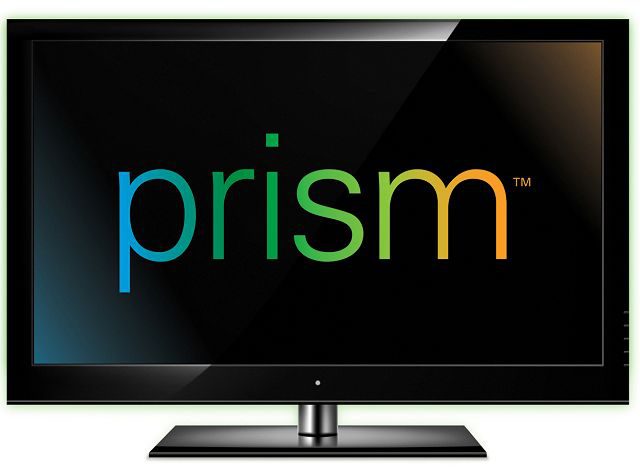
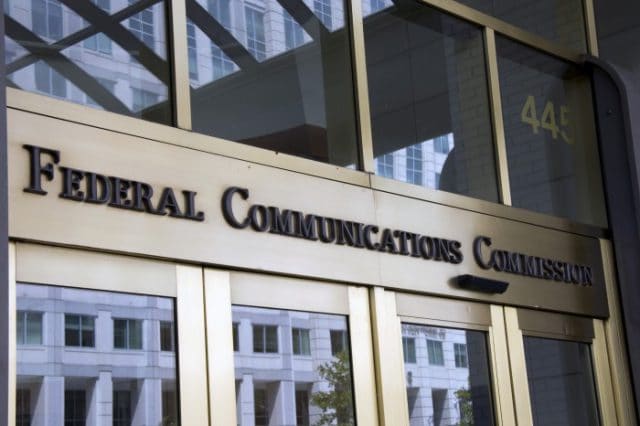 March was a big month for lobbyists visiting the Federal Communications Commission, which opened the doors to wireless special interest groups for “ex parte” meetings with agency staffers that, in turn, brief the three Republicans and two Democrats that serve as FCC commissioners.
March was a big month for lobbyists visiting the Federal Communications Commission, which opened the doors to wireless special interest groups for “ex parte” meetings with agency staffers that, in turn, brief the three Republicans and two Democrats that serve as FCC commissioners. The Competitive Carriers Association (CCA)
The Competitive Carriers Association (CCA) be challenging, and CCA claims unnecessary costs are curtailing additional rural expansion.
be challenging, and CCA claims unnecessary costs are curtailing additional rural expansion. CTIA – The Wireless Association
CTIA – The Wireless Association Verizon
Verizon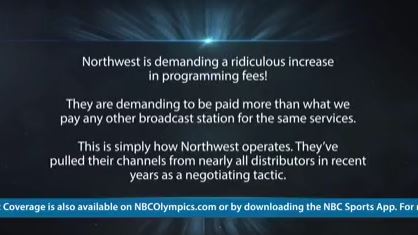 Charter Communications is taking the city of El Centro, Calif., to federal court for interfering in a dispute between Spectrum and a local TV station owner that has resulted in two stations being blacked out on the local cable system for nearly three months.
Charter Communications is taking the city of El Centro, Calif., to federal court for interfering in a dispute between Spectrum and a local TV station owner that has resulted in two stations being blacked out on the local cable system for nearly three months. “Northwest’s pulling its authorization for Charter to carry its broadcast signals is not a ‘service interruption’ within the meaning of the City Code provisions in question,” Charter argued in its lawsuit. “Even if it were, while El Centro demands that Charter ‘cure’ its alleged violations, the only means for Charter to do so is to finalize a retransmission agreement with Northwest. The City’s citations are thus intended to pressure Charter to accept Northwest’s unreasonable terms by imposing fines and intentionally damaging Charter’s reputation and harming its goodwill and relationships with its existing and prospective customers.”
“Northwest’s pulling its authorization for Charter to carry its broadcast signals is not a ‘service interruption’ within the meaning of the City Code provisions in question,” Charter argued in its lawsuit. “Even if it were, while El Centro demands that Charter ‘cure’ its alleged violations, the only means for Charter to do so is to finalize a retransmission agreement with Northwest. The City’s citations are thus intended to pressure Charter to accept Northwest’s unreasonable terms by imposing fines and intentionally damaging Charter’s reputation and harming its goodwill and relationships with its existing and prospective customers.” “Rather than negotiating in good faith like all other parties would do and what the law requires, Charter has taken a ‘take it or leave it’ approach,” added Brady. “In an effort this week to get this back on track, Northwest submitted a new proposal to Spectrum. Spectrum’s representative communicated that they really wanted to get this resolved, but would not counter Northwest’s proposal and would not respond at all in writing. Odd behavior for a company that claims to be negotiating in good faith. It appears that Charter would rather bully a small municipality than to engage in a good faith negotiation.”
“Rather than negotiating in good faith like all other parties would do and what the law requires, Charter has taken a ‘take it or leave it’ approach,” added Brady. “In an effort this week to get this back on track, Northwest submitted a new proposal to Spectrum. Spectrum’s representative communicated that they really wanted to get this resolved, but would not counter Northwest’s proposal and would not respond at all in writing. Odd behavior for a company that claims to be negotiating in good faith. It appears that Charter would rather bully a small municipality than to engage in a good faith negotiation.”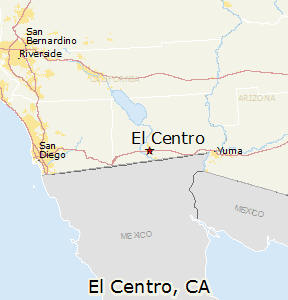 “Despite the fact the fee is itemized and justified as a pass-through, Charter did not eliminate or reduce that fee, even though it was no longer incurring costs associated with carriage of … at least two network affiliates,” Crescent City officials told the FCC.
“Despite the fact the fee is itemized and justified as a pass-through, Charter did not eliminate or reduce that fee, even though it was no longer incurring costs associated with carriage of … at least two network affiliates,” Crescent City officials told the FCC.